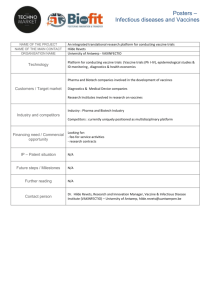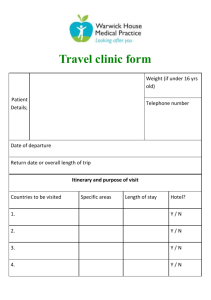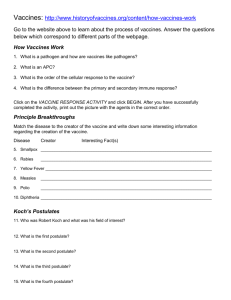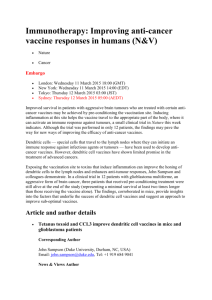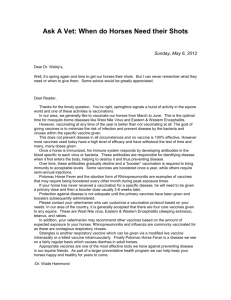CGD Brief Making Markets for Vaccines–Ideas to Action Introduction By Owen Barder *
advertisement
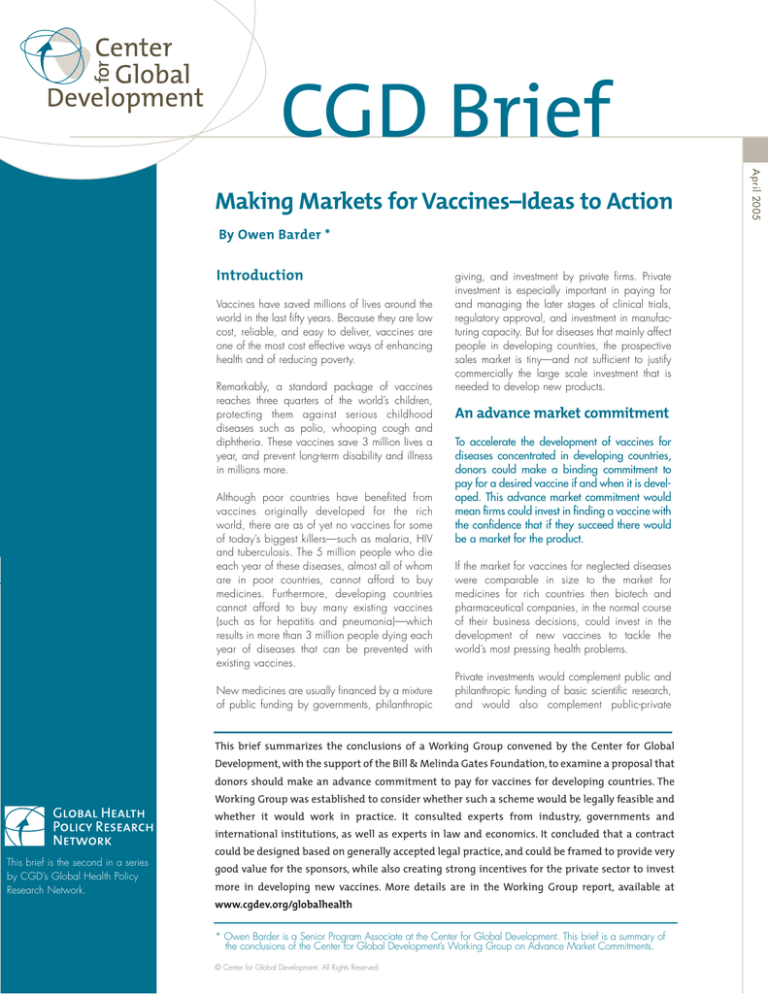
CGD Brief By Owen Barder * Introduction Vaccines have saved millions of lives around the world in the last fifty years. Because they are low cost, reliable, and easy to deliver, vaccines are one of the most cost effective ways of enhancing health and of reducing poverty. Remarkably, a standard package of vaccines reaches three quarters of the world’s children, protecting them against serious childhood diseases such as polio, whooping cough and diphtheria. These vaccines save 3 million lives a year, and prevent long-term disability and illness in millions more. Although poor countries have benefited from vaccines originally developed for the rich world, there are as of yet no vaccines for some of today’s biggest killers—such as malaria, HIV and tuberculosis. The 5 million people who die each year of these diseases, almost all of whom are in poor countries, cannot afford to buy medicines. Furthermore, developing countries cannot afford to buy many existing vaccines (such as for hepatitis and pneumonia)—which results in more than 3 million people dying each year of diseases that can be prevented with existing vaccines. New medicines are usually financed by a mixture of public funding by governments, philanthropic giving, and investment by private firms. Private investment is especially important in paying for and managing the later stages of clinical trials, regulatory approval, and investment in manufacturing capacity. But for diseases that mainly affect people in developing countries, the prospective sales market is tiny—and not sufficient to justify commercially the large scale investment that is needed to develop new products. An advance market commitment To accelerate the development of vaccines for diseases concentrated in developing countries, donors could make a binding commitment to pay for a desired vaccine if and when it is developed. This advance market commitment would mean firms could invest in finding a vaccine with the confidence that if they succeed there would be a market for the product. If the market for vaccines for neglected diseases were comparable in size to the market for medicines for rich countries then biotech and pharmaceutical companies, in the normal course of their business decisions, could invest in the development of new vaccines to tackle the world’s most pressing health problems. Private investments would complement public and philanthropic funding of basic scientific research, and would also complement public-private This brief summarizes the conclusions of a Working Group convened by the Center for Global Development, with the support of the Bill & Melinda Gates Foundation, to examine a proposal that donors should make an advance commitment to pay for vaccines for developing countries. The Working Group was established to consider whether such a scheme would be legally feasible and whether it would work in practice. It consulted experts from industry, governments and international institutions, as well as experts in law and economics. It concluded that a contract This brief is the second in a series by CGD’s Global Health Policy Research Network. could be designed based on generally accepted legal practice, and could be framed to provide very good value for the sponsors, while also creating strong incentives for the private sector to invest more in developing new vaccines. More details are in the Working Group report, available at www.cgdev.org/globalhealth * Owen Barder is a Senior Program Associate at the Center for Global Development. This brief is a summary of the conclusions of the Center for Global Development’s Working Group on Advance Market Commitments. www.cgdev.org © Center for Global Development. All Rights Reserved. April 2005 Making Markets for Vaccines–Ideas to Action Making Markets for Vaccines—Ideas to Action 2 partnership efforts to build up demand and promote development of a vaccine. ensure that developing countries could afford to continue purchasing the vaccine once payments under the commitment had been made. For diseases such as HIV, TB and malaria there are no available vaccines, and none on the immediate horizon. Other diseases— such as pneumococcus and rotavirus, which together kill nearly 2 million people a year—have vaccines in later stages of development, but based on the historical record it will be many years before these vaccines are widely available in developing countries. Other diseases primarily affecting the developing world for which no vaccines are available include shigella, schistosomiasis, leishmaniasis, chagas disease and dengue. How much would it cost? Creating a market, not a prize In current circumstances, a price that is low enough for developing countries to afford is too low to create incentives for private companies to invest in research and development. To address this problem, the sponsors of an advance market commitment would underwrite a guaranteed price for the vaccine supplier. Developing countries would decide whether to buy a vaccine at a low and affordable price, and sponsors would commit to top-up to a guaranteed price—thus providing market returns for the vaccine developer which are comparable to other products. Once the full number of treatments has been purchased at the guaranteed price, the supplier would, in return, be committed to selling further treatments at an affordable price in the long term. This would A commitment creating a market comparable to the sales revenue of an average new medicine would cost about $3 billion. For example, sponsors could commit to underwriting a price of $15 per treatment for a malaria vaccine for the first 200 million treatments. At this price, the advance market commitment would be a highly cost-effective use of aid, costing an estimated $15 for every life-year saved—a bargain compared with many other development expenditures. An advance market commitment would be payment for results: there would be no cost to sponsors unless a desired vaccine is developed. Accelerating new and existing vaccines As well as stimulating research and development in new vaccines such as for malaria, tuberculosis and HIV, an advance market commitment could be made for new vaccines that are in later stages of development. These include, for example, vaccines for pneumococcal infections and rotavirus. An advance market commitment would create an incentive to accelerate testing of versions of these products suitable for An outline of an Advance Market commitment in practice FOR MALARIA VACCINE* ADVANCE MARKET COMMITMENT EXAMPLE Legally binding contracts, enforceable by law Offer made by a group of sponsors Total market value approximately equal to sales revenues earned by average new medicines Total market size of $3 billion (net present value, 2004 dollars) Sponsors under-write a specific price $15 per treatment (e.g. $5 per dose for 3 doses) Price guarantee applies to a maximum number of treatments Guarantee for first 200 million treatments Treatments sold in eligible countries Vaccine Fund eligible countries In return, the developer guarantees to sell subsequent treatments at a low price $1 per treatment Recipient country makes a co-payment for the vaccines they buy (or asks a donor to do so) $1.00 paid by recipient $14.00 paid by sponsors Successful developers receive $15 per treatment sold. Subsequent vaccines are also eligible for the guaranteed price, if superior to existing vaccines—as developing countries can switch their demand to these subsequent, superior vaccines. An Independent Adjudication Committee oversees the arrangement. * The Working Group used malaria vaccine as a working example. These figures do not necessarily represent the appropriate terms for an actual commitment. 3 Advantages and Risks of Advance Markets SPONSORS FOR FOR FIRMS DEVELOPING COUNTRIES Advantages no cost unless and until a vaccine is developed big increase in potential markets for these products accelerated development of vaccines for most important health challenges can continue to invest in vaccine and other health programs in the meantime greater certainty about future procurement of vaccines built-in long term sustainability removes pressure to sell medicines at loss quicker affordable access to vaccines once they have been developed—no more long delays not an open-ended commitment for donors creates an incentive for firms to develop high-quality products low risk—few opportunities for rent-seeking & corruption consistent with arrangements for intellectual property rights long term sustainability because price drops after initial doses have been purchased quicker returns on vaccines for developing countries inexpensive to administer additional vaccines once delivery system in place good public relations from involvement in making medicines for global health challenges developing countries have final say on what vaccines are purchased need a legally binding commitment and independent adjudication contract must allow use of superior products if they are developed contract should not create incentives for copycat products there will be costs of co-payment for vaccines donors should continue to support R&D directly long term price must be affordable Risks & points to watch need to avoid pushing up the price of vaccines—two stage contract pays more up front but brings prices down sooner contract designed to avoid risk of sponsors being required to pay out for an inappropriate vaccine developing countries, and to invest in sufficient production facilities to enable large-scale, low-cost supply. Is it possible in practice? Governments enter into long-term contracts every day, for everything from aircraft to catering. There is no reason in principle why governments and other sponsors could not sign a long-term contract for vaccines. To illustrate how this could work, the Working Group report includes contract term sheets. The Working Group also finds there is no technical budgetary obstacle to prevent donors from making this form of commitment, if the political will is there. What else needs to be done? Just as public and philanthropic finance alone are unlikely to lead rapidly to the development of new vaccines, so an advance market commitment would be a complement to other essential measures. These include greater investment in existing vaccines, scale-up of investment in health systems to improve vaccine coverage, and continued public and philanthropic investment in R&D for these diseases. All of these measures would enhance, and would be enhanced by, the establishment of an advance market commitment. What are the next steps? Our role was to establish whether the proposal is practical. We concluded that a commitment can be feasibly made, and that doing so would be highly cost-effective from a public health perspective. The numerical example is intended to be Illustrative, but demonstrates that the concept is practical. Implementation of an advance market commitment will require further analysis specific to the target disease. Sponsors and experts from the scientific community will need to make a number of choices in finalizing the commitment, including on technical specification, contract design, and pricing. Consideration should also be given to adapting this proposal for drugs and medical devices, and for other technologies. April 2005 FOR The Center for Global Development is an independent, non-partisan, non-profit think tank dedicated to reducing global poverty and inequality through policy oriented research and active engagement on development issues with the policy community and the public. A principal focus of the Center’s work is the policies of the United States and other industrialized countries that affect development prospects in poor countries. The Center’s research assesses the impact on poor people of globalization and of the policies of governments and multilateral institutions. In collaboration with civil society groups, the Center seeks to identify policy alternatives that will promote equitable growth and participatory development in low-income and transitional economies. The Center works with other institutions to improve public understanding in industrialized countries of the economic, political, and strategic benefits of promoting improved living standards and governance in developing countries. The Global Health Policy Research Network (PRN) is a program of the Center for Global Development that brings together leading experts in public health, economics and other social science and technical fields to develop original, focused research on highpriority global health policy issues. The PRN, which is supported by the Bill & Melinda Gates Foundation, seeks to improve the outcomes of donor decision-making in global health by: Providing a rich evidence-base about policy opportunities and constraints to effective public and private aid in the health sector. Bringing new people and perspectives — both multidisciplinary and global — into health policy analysis to increase the robustness of the debate. Supporting the development of innovative solutions to global health financing and other policy problems. In addition to Advance Market, other PRN Working Groups have contributed to Millions Saved: Proven Successes in Global Health and are exploring: How to build a comprehensive, credible base of information about financial flows to global health, which is responsive to advocacy, program and policy data needs. How to stimulate development agencies to conduct rigorous impact evaluations of major development projects, so that they contribute to global knowledge about what works. For more information on CGD’s Global Health Policy Research Network, please visit www.cgdev.org/globalhealth How can I find out more? Working Group members The Working Group report is available at http://www.cgdev.org Ruth Levine, Center for Global Development (Co-Chair); Alice Albright, The Vaccine Fund (Co-Chair); Michael Kremer, Harvard University, The Brookings Institution, and Center for Global Development (Co-Chair); Abhijit Banerjee, Massachusetts Institute of Technology; Amie Batson, The World Bank; Ernst Berndt, Sloan School of Management, Massachusetts Institute of Technology; Lael Brainard, The Brookings Institution; David Cutler, Harvard University; David Gold, Global Health Strategies; Peter Hutt, Covington & Burling; Randall Kroszner, University of Chicago; Tom McGuire, Harvard University Medical School; Tomas Philipson, U.S. Food and Drug Administration; Leighton Read, Alloy Ventures; Tom Scholar, International Monetary Fund; Raj Shah, Bill & Melinda Gates Foundation; David Stephens, Emory University; Wendy Taylor, BIO Ventures for Global Health; Adrian Towse, Office of Health Economics; Sean Tunis, U.S. Department of Health and Human Services; Sharon White, UK Department for International Development; Victor Zonana, Global Health Strategies. /vaccine. The report sets out our analysis in full, and includes a more detailed explanation of how an advance market commitment could be designed. The website also includes a spreadsheet tool which allows users to analyze the size and cost-effectiveness of advance purchase commitments for malaria, HIV, and TB under a range of assumptions about vaccine characteristics and contract structures. For more further information, please contact Owen Barder at the Center for Global Development, by e-mail at obarder@cgdev.org, or by post at 1776 Massachusetts Ave. NW, Suite 301, Washington, DC 20036. Telephone (202) 416-0700. Working Group members serve in a personal capacity, and this report does not necessarily represent the view of the organization to which they are affiliated.
